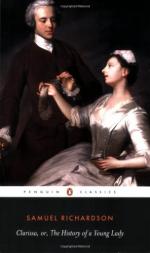She said, her dear friend was so earnest for a line or two, that she fain would write, if she could: and she tried—but to no purpose. She could dictate, however, she believed; and desired Mrs. Lovick would take pen and paper. Which she did, and then she dictated to her. I would have withdrawn; but at her desire staid.
She wandered a good deal at first. She took notice that she did. And when she got into a little train, not pleasing herself, she apologized to Mrs. Lovick for making her begin again and again; and said, that the third time should go, let it be as it would.
She dictated the farewell part without hesitation; and when she came to blessing and subscription, she took the pen, and dropping on her knees, supported by Mrs. Lovick, wrote the conclusion; but Mrs. Lovick was forced to guide her hand.
You will find the sense surprisingly entire, her weakness considered.
I made the messenger wait while I transcribed it. I have endeavoured to imitate the subscriptive part; and in the letter made pauses where, to the best of my remembrance, she paused. In nothing that relates to this admirable lady can I be too minute.
WEDN. NEAR THREE O’CLOCK.
MY DEAREST MISS HOWE,
You must not be surprised—nor grieved—that Mrs. Lovick writes for me. Although I cannot obey you, and write with my pen, yet my heart writes by her’s—accept it so—it is the nearest to obedience I can!
And now, what ought I to say? What can I say?—But why should not you know the truth? since soon you must—very soon.
Know then, and let your tears be those, if of pity, of joyful pity! for I permit you to shed a few, to embalm, as I may say, a fallen blossom— know then, that the good doctor, and the pious clergyman, and the worthy apothecary, have just now—with joint benedictions—taken their last leave of me; and the former bids me hope—do, my dearest, let me say hope —hope for my enlargement before to-morrow sun-set.
Adieu, therefore, my dearest friend!—Be this your consolation, as it is mine, that in God’s good time we shall meet in a blessed eternity, never more to part!—Once more, then, adieu!—and be happy!—Which a generous nature cannot be, unless—to its power—it makes others so too.
God for ever bless you!—prays, dropt on my bended knees, although supported upon them,
Your obliged, grateful, affectionate,
CL. Harlowe.
***
When I had transcribed and sealed this letter, by her direction, I gave it to the messenger myself, who told me that Miss Howe waited for nothing but his return to set out for London.
Thy servant is just come; so I will close here. Thou art a merciless master. These two fellows are battered to death by thee, to use a female word; and all female words, though we are not sure of their derivation, have very significant meanings. I believe, in their hearts, they wish the angel in the Heaven that is ready to receive her, and thee at the proper place, that there might be an end of their flurries—another word of the same gender.




